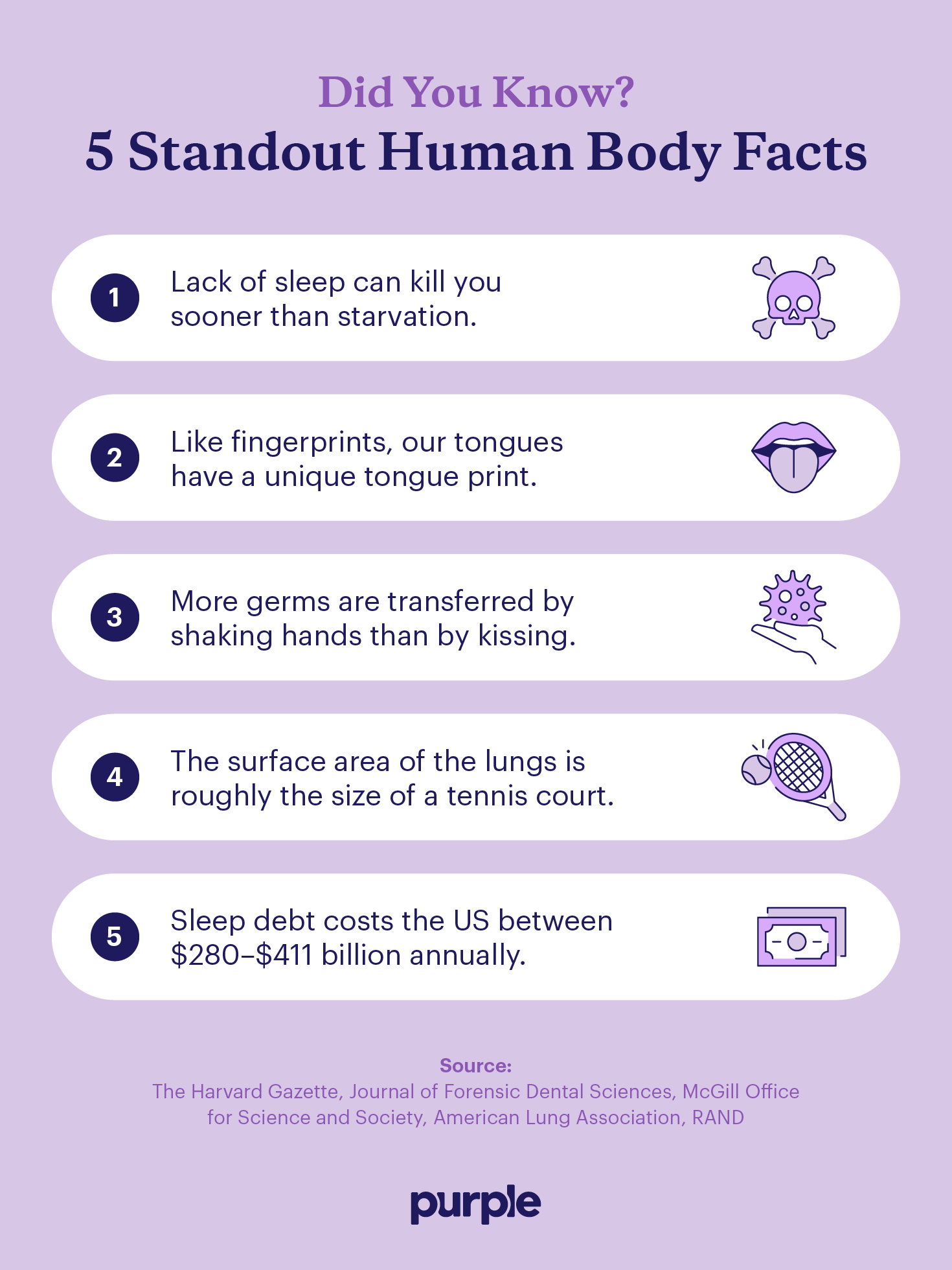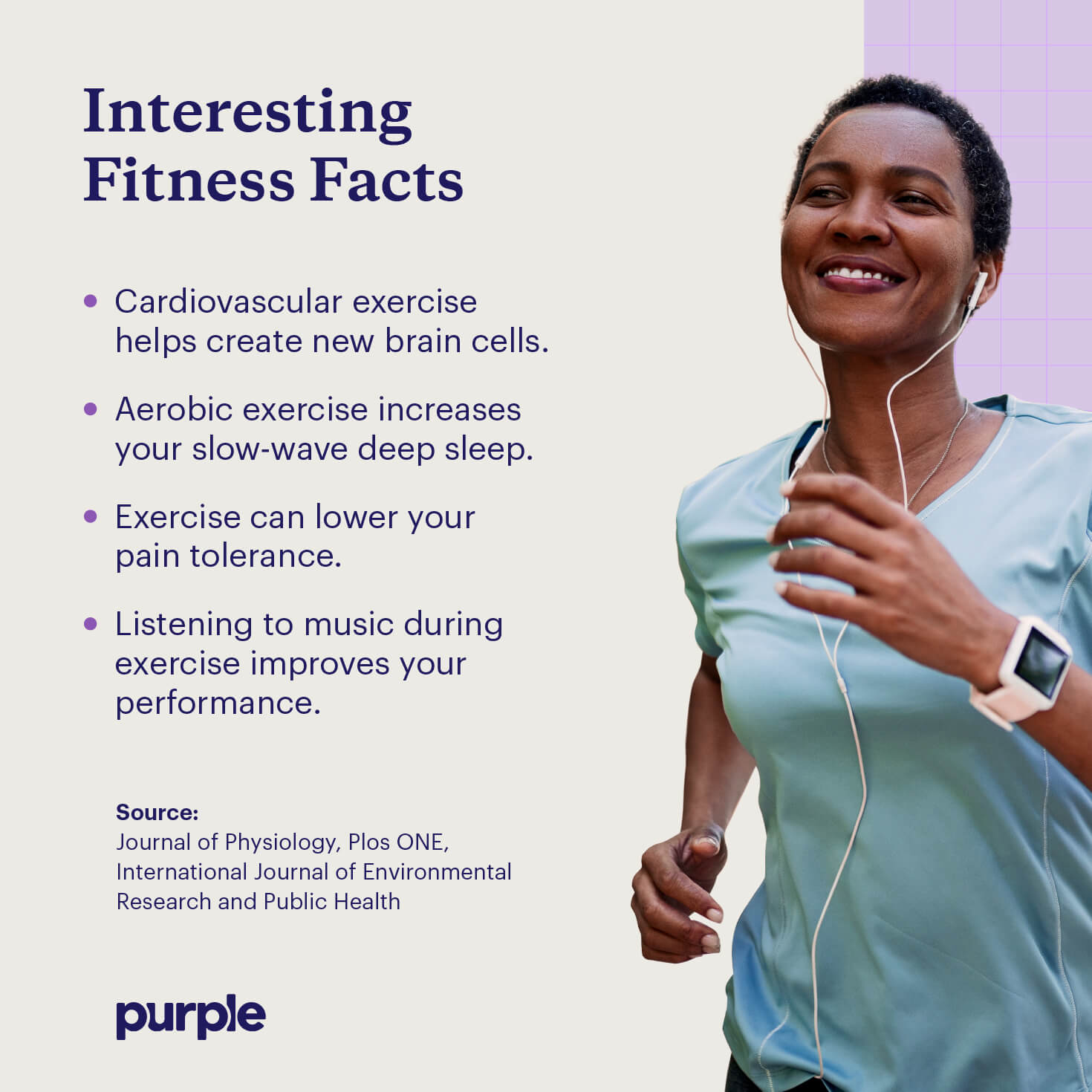
55 Weird Facts About the Human Body
Random facts about the human body
- Humans can distinguish at least 1 trillion different odors, far surpassing the previously thought 10,000.1
- Babies are born with around 300 bones, but adults only have 206.2
- While our brains process pain signals from all over the body, the brain itself cannot feel pain.3
- Over a lifetime, a person produces enough saliva to fill two swimming pools.4
- Humans share approximately 60% of their DNA with bananas.5
The human body is full of strange and fascinating quirks. While some of these oddities may seem like minor inconveniences or irrelevant information, they can often provide clues to our overall health and well-being.
Understanding these weird facts about the human body can satisfy your curiosity and also shed light on how to optimize your health, including getting a good night's sleep.
Keep reading to learn some of our favorite weird facts about the human body and facts about sleep — some you may have heard before and others that might surprise you.
- 20 Amazing Facts About the Human Body
- 10 Health and Wellness Facts
- 5 Facts About the Circulatory System
- 5 Facts About the Respiratory System
- 10 Facts About the Digestive System
- 5 Facts About Fitness and Exercise
20 Amazing Facts About the Human Body
The human body is an incredibly complex system made up of trillions of cells. From our DNA to our organs, there are countless fascinating details to discover. We'll explore a range of amazing facts, covering everything from bone strength to organ function. Some facts show how resilient and adaptable our bodies are, while others are just plain strange.
- The average adult human has 206 bones.6
- On average, humans have 46 chromosomes or 23 pairs of chromosomes.7
- Over half of the human bones can be found in the upper and lower extremities.6
- A quarter of human bones (52 on average) are found in the feet.8
- In the average human adult body, there are at least 67 different species of bacteria residing in the belly button alone.9
- The human body is teeming with microbes. Our skin is said to have its own thriving ecosystem.10
- Most people shed up to 35 kilograms of skin in their lifetimes.11
- Your body produces enough heat in 30 minutes to boil half a gallon of water.12
- The average body temperature is 98.6 F, but humans can expend roughly 350,000 joules of energy per hour – the same amount of energy that a 100-watt light bulb gives off.13
- Identical twins have extremely similar scents due to their shared DNA.14
- Humans share 60% of their DNA with bananas, meaning we have some similar genes that perform basic cellular functions.5
- It's common knowledge that humans share approximately 96% of their DNA with chimpanzees, but we're also closely genetically related to bananas and slugs, sharing up to 70% of DNA.5
- Your height differs depending on the time of day because the cartilage between your bones compresses throughout the day.15
- The human brain operates on 12 to 25 watts of power.16
- Human noses can distinguish a vast number of scents, potentially up to 1 trillion13 — not nearly as powerful as a dog's, whose sense of smell is 1,000 to 10,000 times better than ours.17
- We have pain receptors and process pain signals in our brains, but the brain itself does not feel pain.3
- While often thought to be the strongest muscle, the tongue is actually a group of muscles that are incredibly flexible and versatile. The jaw muscle is generally considered the strongest in terms of force.18
- Like fingerprints, our tongues have a unique tongue print.19
- Babies are born with around 300 bones, but adults only have 206.2
- Your stomach replaces its lining every 3-4 days. This is because the strong acids that help digest food would also digest the stomach itself.20
10 Health and Wellness Facts
Maintaining optimal health is a multifaceted process, involving everything from nutrition and exercise to sleep and stress management. Here are some interesting and fun wellness facts that shed light on the interconnectedness of our physical and mental health.
- More germs are transferred by shaking hands than by kissing.21
- Our hands come into contact with millions of germs and bacteria each day.22
- In the US, only around 35% of adults have perfect vision (20/20) without glasses, contacts, or corrective surgery.23
- Age-related eye diseases are among the leading causes of blindness and low vision.24
- A 2019 meta-analysis found that for each kilogram increase in birth weight, infants had a 44% increased risk of childhood food allergies.25
- Lack of sleep can kill someone sooner than starvation.26
- Chronic sleep deprivation is linked to a higher risk for cardiovascular disease, insulin resistance, obesity, and a host of other life-threatening conditions.27
- The relationship between stress and sleep is clear: When you’re stressed, your body releases cortisol, which keeps you alert.28
- Sleep problems have a ripple effect on society, and sleep debt is said to cost the US between $280 and $411 billion annually.29
- Exercise can be as effective as medication for treating mild to moderate depression.30
5 Facts About the Circulatory System
The circulatory system is responsible for delivering oxygen, nutrients, and hormones throughout the body while removing waste products. This intricate system, comprising the heart, blood vessels, and blood, plays a crucial role in maintaining overall health and well-being. Let's explore some fun health facts about this essential system.
- The human heart delivers blood to the body through a superhighway consisting of approximately 60,000 miles of blood vessels.31
- 7%-8% of your body mass is made up of your blood.32
- It takes about 20 seconds for a red blood cell to circulate through your entire body.33
- Veins, which carry blood to the heart, have one-way valves that ensure blood flows in only one direction.34
- Arteries, which carry blood away from the heart, don't need valves because the blood pressure from the heart is strong enough to make blood flow in one direction.35
5 Facts About the Respiratory System
Have you ever struggled with bedroom allergies? The quality of our sleep is deeply intertwined with the efficiency of our respiratory system. This intricate system, comprising our airways, lungs, and supporting muscles, is essential for restful, restorative sleep. Below, find some quick health facts about this system and its profound impact on our overall health and sleep quality.
- Humans inhale and exhale through one nostril at a time.36
- In most people, the left lung is 10% smaller than the right because the heart takes up a significant amount of space on the left side.37
- We breathe approximately 11,000 liters of air every day.38
- The surface area of the lungs is roughly the size of a tennis court.39
- Your lungs don’t just take in oxygen and expel carbon dioxide; they also warm the air you inhale to your body temperature and add humidity to meet your body’s needs.40
10 Facts About the Digestive System
While we sleep, our digestive system continues to work, albeit at a slower pace. The food we consume throughout the day is processed, and nutrients are absorbed, impacting our overall health and potentially influencing our sleep quality (did you know there are certain foods that can help you sleep better?). A healthy digestive system can contribute to better sleep, while digestive issues can disrupt our rest. Below, find some fun facts about the human body specific to the digestive system.
- Your fluid levels can drop by 2%-3% of your body weight before you even notice that you’re thirsty.41
- Ever heard the recommendation to drink 8 glasses of water a day? How much water you need actually depends on body weight, environmental temperature, and physical activity.42
- Up to 20% of your fluids are gained through water-rich foods like watermelon, grapefruit, cucumbers, spinach, and soup.43
- You can actually drink too much water; hyponatremia is a rare but life-threatening condition that occurs when you over-hydrate, making your sodium levels dip dangerously low.44
- Drinking coffee won't dehydrate you, though it is a diuretic.45
- Most people produce enough saliva in their lifetimes to fill two swimming pools.4
- Saliva protects our mouths from oral infections while also helping us begin digesting our food.46
- Food can travel through your digestive system even if you're standing on your head.47
- The small intestine is about 20 feet long.48
- Your stomach produces hydrochloric acid, which is strong enough to dissolve metal (but protected by a mucus lining).49
5 Facts About Fitness and Exercise
Exercise is known for its physical health benefits, but its impact on sleep is often overlooked. Regular physical activity can dramatically improve sleep quality, making it easier to fall and stay asleep. However, if you don't fix your sleep schedule, your workouts and recovery may suffer. Let's explore some fascinating facts about fitness and exercise, highlighting this crucial connection.
- Cardiovascular exercise prompts the creation of new brain cells.50
- Regular, moderate aerobic exercise is said to increase the amount of slow-wave sleep or rejuvenate deep sleep.51
- Not only can exercise relieve chronic pain, but it can also raise one’s pain tolerance and lower pain perception.52
- Listening to music while working out can improve your performance by up to 15%.53
- Strength training is just as important for your heart as cardio.54
Get the Best Support for Your Body
Knowing how our bodies function—even if it’s through random health facts—is key to making healthy choices. From digestion and circulation to exercise and hydration, we can actively support our well-being.
If you're constantly wondering what to do when you can't sleep, consider the foundation of sleep: your mattress. A mattress that offers a blend of softness and support, like the Rejuvenate® mattress, can provide the proper spinal alignment you need and the soothing pressure relief your body wants for deeply restful sleep. Combined with an adjustable base, you can get more restorative rest to better support your health.
FAQ
One of the strangest facts about humans is that we can distinguish at least 1 trillion different smells, a far cry from the previously believed 10,000.1
- Small intestine: If you stretched it out completely, the small intestine would be about 20 feet long—roughly the size of a tennis court.55
- Stomach: The stomach produces hydrochloric acid, a substance so strong it could dissolve metal, but it's protected by a thick mucus lining.49
- Lungs: The total surface area of the lungs, thanks to millions of tiny air sacs called alveoli, is approximately the size of a tennis court.39
- Heart: The heart pumps blood through approximately 60,000 miles of blood vessels, enough to circle the Earth more than twice.31
- Tongue: Each person has a unique tongue print, just like fingerprints, making it a potential biometric identifier.19
The human body's ability to heal itself is pretty remarkable, from clotting blood to repairing wounds to regenerating some tissues. This complex process involves a coordinated effort of different systems working together to restore balance and function, pointing to the body's inherent resilience.











